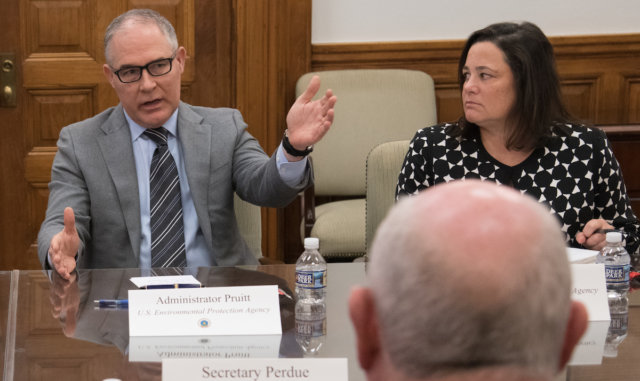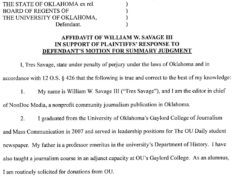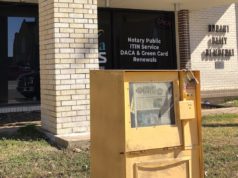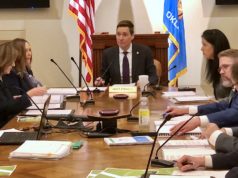

Last week, beleaguered Environmental Protection Agency administrator Scott Pruitt saw his office receive even more national criticism, this time for the attempted exclusion of an Associated Press reporter from a public meeting.
A Pruitt aide reportedly called AP journalist and Oklahoma native Ellen Knickmeyer to apologize for her forceful removal from a national summit on dangerous chemicals.
But the events in question are still contemptible, and the scenario underscores the floundering nature of Pruitt’s national service, which has already drawn scrutiny for expensive travel arrangements, a dubious condo-rental relationship and his infamous soundproof phone booth during his 15 months as EPA administrator.
Perplexingly, this saga could have been avoided altogether if communications staffers in Pruitt’s office had not exhibited such shockingly poor media-relations skills. While such incompetence may have surprised some on the national level, Oklahomans who recall Pruitt’s time as the state’s attorney general should hardly be surprised.
‘We can make you get out’
In the case of Ellen Knickmeyer, Pruitt’s staff is likely looking back on the situation and wondering why they did not simply allow the journalist to attend the meeting without hassle.
From the AP’s own coverage, which was written by David Bauder and not Knickmeyer:
Pruitt had convened what he called a national summit on dangerous chemicals that have been found in some water systems. Some 200 people attended, including representatives of states, tribes and the chemical industry and environmentalists.
Pruitt’s remarks at the meeting were listed on his public schedule and described as being open to the press on a federal daybook of events.
Knickmeyer said she called Monday about the event and was told by EPA spokesman Jahan Wilcox that it was invitation-only and there was no room for her. She said she showed up anyway, and was told by a security guard that she couldn’t enter. She said she asked to speak to a representative from the press office, was refused and told to get out. Photos of the event showed several empty seats.
After security told her that “we can make you get out,” Knickmeyer said she took out her phone to record what was happening. Some of the security guards reached for it, and a woman grabbed her shoulders from behind and pushed her about five feet out the door.
Wilcox issued a statement late Tuesday saying Knickmeyer “pushed through the security entrance.” After the AP objected to the characterization, the spokesman issued a second statement removing that account and instead saying Knickmeyer “showed up at EPA but refused to leave the building after being asked to do so.”
“When we were made aware of the incident, we displaced stakeholders to the overflow room who flew to Washington for this meeting so that every member of the press could have a seat,” Wilcox said.
The idea that “every member of the press could have a seat” should not have been so difficult to accommodate in the first place. In fact, it is the sort of concept that trained media-relations professionals deal with on a daily basis to ensure positive relationships with press.
Pruitt’s approval rating drops below journalists’
In many ways, this AP-reporter fiasco begs questions about whether Pruitt has been afflicted with incompetent communications professionals or whether the attempt to prohibit access to certain journalists was a top-down directive. To a certain extent, the blame game matters little.
What onlookers from Oklahoma are likely aware of, however, is that Pruitt’s political history shows a great deal of disrespect for the concept of open government.
Be it the controversial Tar Creek audit that then-Attorney General Scott Pruitt fought to keep secret or his office’s routine delays in responding to open records requests — which resulted in legal action — Pruitt has clearly found it difficult to develop positive relationships with media.
Without going into great detail, the people involved in Pruitt’s communications during his attorney general stint have proven themselves fully capable of working well with media in other jobs, providing additional evidence that Pruitt’s media problems are at least somewhat his own doing.
As Pruitt’s approval rating drops — even below that of journalists, amazingly — his office’s interaction with Knickmeyer should serve as a reminder to all politicians at all levels from all parties: Your best bet with the press is to show them respect. If you do and they don’t, it looks a lot better than if politicians cast the first stone.
Or if they cast the first journalist out into the hallway.




















